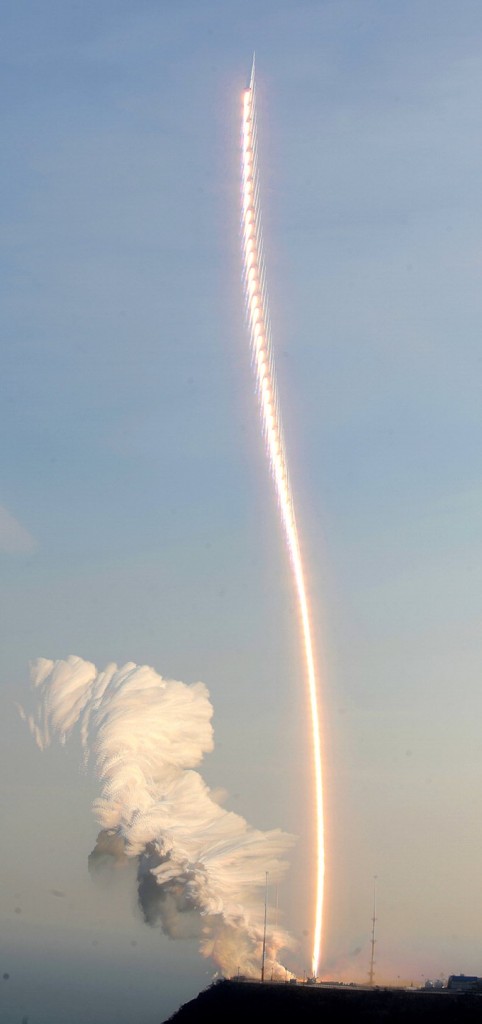- California Assembly OKs highest minimum wage in nation
- S. Korea unveils first graphic cigarette warnings
- US joins with South Korea, Japan in bid to deter North Korea
- LPGA golfer Chun In-gee finally back in action
- S. Korea won’t be top seed in final World Cup qualification round
- US men’s soccer misses 2nd straight Olympics
- US back on track in qualifying with 4-0 win over Guatemala
- High-intensity workout injuries spawn cottage industry
- CDC expands range of Zika mosquitoes into parts of Northeast
- Who knew? ‘The Walking Dead’ is helping families connect
S. Korea, US to work together against outer space waste

This composite photo made of 129 sheets of photos shows the Korea Space Launch Vehicle-1 ascending after takeoff from the Naro Space Center in Goheung on South Korea’s south coast on Jan. 30, 2013. The Korea Aerospace Research Institute launched the Science and Technology Satellite-2C, a scientific satellite, on the rocket also known as Naro. (Yonhap)
By Kim Hyo-jin
Korea and the United States have agreed to jointly take measures against space debris in response to the rising risk of possible collisions with satellites.
Officials from both governments held their first annual talks on space policies at the U.S. State Department in Washington D.C. Thursday and shared concerns about the increasing space waste.
The agreement came days after a South Korea satellite barely avoided a collision with a piece of debris produced by the 2009 collision between an inactive Russian communications satellite and an active U.S. satellite.
“Securing stability in space is becoming more important as there is an increasing amount of space debris that can possibly collide with satellites,” said a foreign ministry official, adding that both nations shared the necessity of jointly responding to the issue.
During the talks, they discussed joint measures to raise “Space Situational Awareness.” This refers to the ability to view, understand and predict the physical location of natural and manmade objects in orbit around the Earth.
Both parties are expected to hold a second dialogue sometime next year.












![trump[reuters]](http://www.koreatimesus.com/wp-content/uploads/2024/05/2023-06-10T235115Z_520439966_RC2NG1AXVQJW_RTRMADP_3_USA-TRUMP-copy-120x134.jpg)



George Worthington
January 9, 2015 at 1:55 PM
Deorbiting or salvaging junk in space should be big business in the near future. Public space programs throughout the world should spend money to address this problem. Not only is there a direct benefit of cleaning up earth orbit but commercial space can use such programs to boat strap us into Space